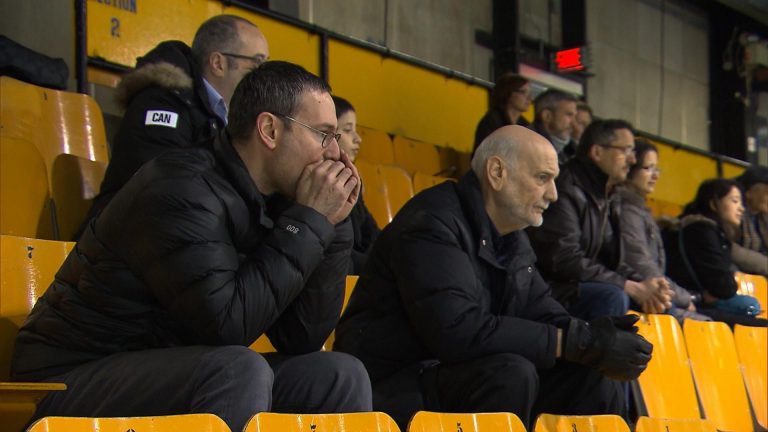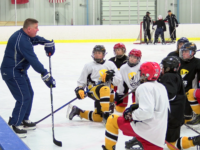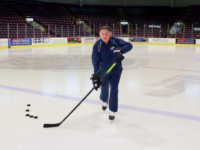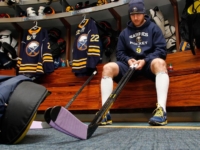Imagine this: you’re a hockey parent sitting in the stands, cheering your child on during their hockey game. You’ve been to enough games to know how your child’s performance compares to everyone else’s on the team. Strangely, your child gets switched out with another player you feel is less skilled, and furthermore gets more ice time, even though in your opinion he’s not at the same level as your child.
You spend the next few days wondering why the coach kept this player in the game for so long, only to find out at the next practice (through the grapevine), that this player’s parents have sponsored the team. This is a perfect example of politics in action in minor hockey. You and the rest of the parents are now assuming that the coach has been inclined to give preferential treatment to this player and his parents.
These types of situations should never happen and thankfully for the most part they don’t. Unfortunately, however, unnecessary “politics” can happen. So, what exactly are minor hockey politics, and how can the situations that politics create be dealt with?
What Are ‘Politics’ in Minor Hockey?
The term “politics” is used very loosely when applied to anything other than actual governments and elections. An informal definition of “hockey politics” is: Any hockey-related issue spurred by a clearly unfair situation created by the deliberate choice of one or more individuals. For minor hockey, the “individuals” in the definition can be members of the team staff or fellow parents of kids on the team.
For the example above, the assumed “unfair situation” is that Jake will receive preferential treatment from the coach, like getting more ice time than the other players on the team. The “deliberate choice” to give preferential treatment is made by the coach. Yes, it is a choice. The coach isn’t forced to give Jake extra ice time, they just chose to do it because of the large donation that Jake’s parents presumably made. It’s important to make that distinction, since unfair situations sometimes come about where nobody involved has a say in the matter.
Most parents will have to deal with hockey politics in one form or another at some point in their child’s hockey career, so knowing how to deal with these situations properly is crucial.
Avoid Politics If Possible
The easiest way to deal with politics in minor hockey is to just not get involved in them in the first place. Don’t ask the coach for special treatment for your child, nor use bribery in any form. If the coach offers you a position on the team staff because the two of you are friends, be honest about your capabilities of filling the role. Don’t take the position without knowing you have the appropriate skillset.
If other parents try to get you involved in what seems like political issues, stay far away. You and your child will be able to enjoy the hockey season much more without having any drama to worry about.
Of course, some situations are unavoidable, and you can be affected by them without having a choice. If this is the case, then look at the 4-step process for solving these issues.
The 4-Step Process
Here is a general four-step process for dealing with minor hockey politics. The process is designed to deal with any issue quickly while still maintaining good relationships with the people involved in the problem. Keep in mind that political situations can be very dynamic and diverse, so this method won’t work in every case. The main idea to keep in mind is to deal with the problem quickly and to be calm and courteous at all times.
1. Determine the validity of the problem
Think back to the definition of hockey politics. There are three criteria that determine if a situation is the result of “politics” and whether you should do something about it. The first is that the situation is clearly unfair. Second, it needs to be the result of someone’s deliberate choice. Lastly, look at whether it affects you or not. Even if hockey politics are running rampant through your team or league, if none of it is negatively affecting you or your child, then you don’t have to get involved. It would be selfless to try and help with issues you aren’t affected by, but it isn’t necessary by any means. Sometimes it can create unwanted problems.
If all three of the criteria are met, then it may be time to act.
2. Approach the right person
This will almost always be the coach or team staff, not a fellow parent. If the issue is with a parent, use the coach or manager as a mediator to deal with it. They have more power than any parent does in terms of solving the problem, and likely don’t want any members of their team to be involved in politics. Therefore, they’ll likely be ready and willing to help. If a fellow parent is petty enough to involve themselves in hockey politics in the first place, then approaching them directly about problems usually won’t lead to a solution.
If the issue is with the coach, then it is usually beneficial to try and discuss it directly with them first. Other parents have nothing to lose other than their pride and dignity. The team’s coach, however, is in a position of authority, and has a reputation to uphold. There is also an expectation that they will behave fairly towards every player and parent. For these reasons, they should be more understanding and willing to solve political issues than another parent would be.
If, however, you’ve tried to work out the problem with the coach and they seem unwilling to help fix it, it may be worth approaching the league directly. The board members of can be great points of contact for dealing with major issues that the coach can’t or won’t fix.
3. Deal with the issue in one fell swoop
“Bring the issue up, then put it to bed.” Simple. For any political issue in your minor hockey experience, deal with it as efficiently as possible. Don’t be passive-aggressive towards the other people involved, nor harbour grudges after the issue is solved. If you ignore this advice, you’ll frequently find “solved” problems popping up again and creating further headaches, and nobody wants that. Ultimately, keep the reasons in mind for placing your child in a hockey league in the first place: fun and personal development.
4. Be Courteous
Try your best to leave anger and other emotions aside. Depending on the nature of the problem, this can be difficult. However, approaching the problem with an unbiased and courteous voice will ensure that you maintain good relationships with the other parties involved.
Let’s say you feel the coach intentionally picks on your child for some unfair reason. Of course, the goal is to end the issue and make sure the coach treats your kid fairly. However, if you’re aggressive, rude, and insulting in your approach, it can leave you with a tense and poor relationship with the coach, even if the problem gets solved. Overall, being calm & courteous is always the way to go.
Minor hockey politics can be a terrible headache for everyone involved. They take the focus away from the game and shift it to petty arguments and unfair situations. If these situations are left unchecked, they can ruin an entire season of hockey for parents and their kids, which is something of a tragedy.
Remember, avoid hockey politics. If it isn’t possible, then approach each situation using the 4-step process: determine if it is a valid problem, approach the correct person (or people) directly, deal with the issue efficiently, and be courteous the whole time. If you use this method, you’ll have the best chance at solving these political issues right away and maintaining good relationships at the same time. That way, you and your fellow hockey parents, the team staff, and all the team members can keep the focus on what’s really important – playing hockey!






